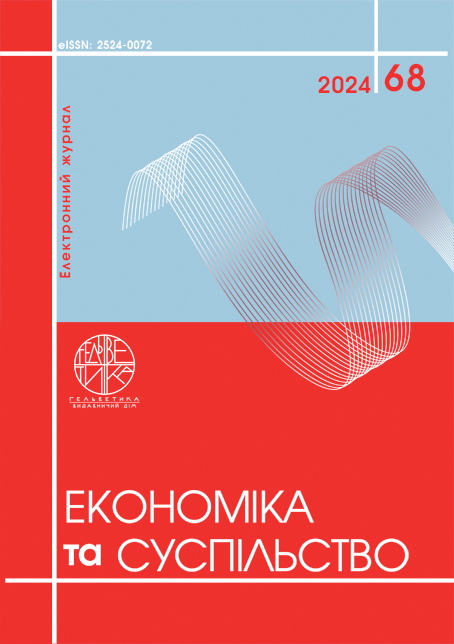PROSPECTS FOR THE USE OF ARTIFICIAL INTELLIGENCE IN HUMAN RESOURCE MANAGEMENT PROCESSES: ANALYSIS OF BENEFITS, RISKS, AND DEVELOPMENT PERSPECTIVES
Abstract
Digitization within Human Resource Management (HRM) has resulted in Artificial Intelligence (AI) becoming increasingly prevalent in Human Resource Management Systems (HRMS) and HR Information Systems. The article focuses on exploring the role of artificial intelligence in human resource management processes. The study examines the potential advantages of AI implementation, such as automating routine tasks, improved recruitment processes, enhanced employee development, saving HR specialists’ time, improving analytics, and supporting data-driven decision-making. The paper highlights the challenges and risks associated with integrating AI into HR, particularly the necessity for HR professionals to develop critical competencies such as algorithmization, critical thinking, and proficiency in handling large datasets. To address these challenges, the paper proposes a framework for successful AI integration in HR. A detailed analysis of current AI language models is presented, emphasizing their characteristics and practical applications in HRM, including tools like ChatGPT, Claude, Bard, and Llama. These tools enable the automation of recruitment processes, resume analysis, job offer creation, and employee communication. However, the research also underscores the risks of excessive reliance on AI, such as potential biases in data and decision-making, loss of essential HR skills, and ethical concerns. Special attention is given to the importance of maintaining the human element in HR processes, ensuring empathy, creativity, and leadership capabilities are not overlooked. The paper concludes by proposing that combining human intelligence with artificial intelligence can drive both efficiency and humanity in organizational development. This synergy offers HR departments new opportunities for fostering innovation while upholding ethical principles and enhancing employee satisfaction. The rapid pace of modern innovative development is driving an increasing demand for the integration of advanced digital technologies into organizational management processes, particularly the adoption of artificial intelligence tools. These swift advancements promise significant benefits but also pose various challenges for organizations, requiring effective solutions.
References
Amla M. Digital Transformation in HR. International Journal of Interdisciplinary and Multidisciplinary Studies, 2017, 4(3). 536-544. URL:http://www.ijims.com (дата звернення: 17.11.2024)
Delecraz, L. Eltarr, M. Becuwe. Responsible Artificial Intelligence in Human Resources Technology: An innovative inclusive and fair by design matching algorithm for job recruitment purposes. Journal of Responsible Technology, 2022. URL:https://www.sciencedirect.com/science/article/pii/S266665962200018X (дата звернення: 23.11.2024)
How many hours are employees saving due to gen AI?: веб-сайт. URL: https://www.hcamag.com/us/news/general/how-many-hours-are-employees-saving-due-to-gen-ai/485945 (дата звернення: 17.11.2024)
IDC FutureScape: Worldwide Future of Work 2024 Predictions: веб-сайт. URL:https://www.idc.com/getdoc.jsp?containerId=US49963723 (дата звернення: 17.11.2024)
Машлій Г., Мосій О., Пельчер М. Дослідження управлінських аспектів використання штучного інтелекту. Галицький економічний вісник. Том 57. No 2. С. 80–89.
Rathi D. Artificial intelligence and the future of hr practices. International Journal of Applied Research, 2018. 4(6): 113-116. URL: www.allresearchjournal.com (дата звернення: 22.11.2024)
The economic potential of generative AI: The next productivity: URL: https://www.mckinsey.com/capabilities/mckinsey-digital/our-insights/the-economic-potential-of-generative-ai-the-next-productivity-frontier/ (дата звернення: 17.11.2024)
Yawalkar V. A. Study of Artificial Intelligence and its role in Human Resource Management. International Journal of Research and Analytical Reviews, 2019. 6(1). 20-24. – URL: https://www.ijrar.org/papers/IJRAR19UP004.pdf (дата звернення: 23.11.2024)
Amla M. (2017). Digital Transformation in HR. International Journal of Interdisciplinary and Multidisciplinary Studies, 4(3). 536-544. Retrieved from: http://www.ijims.com.
Delecraz, L. Eltarr, M. Becuwe (2022). Responsible Artificial Intelligence in Human Resources Technology: An innovative inclusive and fair by design matching algorithm for job recruitment purposes. Journal of Responsible Technology, 11. Retrieved from: https://www.sciencedirect.com/science/article/pii/S266665962200018X
How many hours are employees saving due to gen AI? Retrieved from: https://www.hcamag.com/us/news/general/how-many-hours-are-employees-saving-due-to-gen-ai/485945
IDC FutureScape: Worldwide Future of Work 2024 Predictions. (2024). Retrieved from:: https://www.idc.com/getdoc.jsp?containerId=US49963723/
Mashliy G., Mosiy O., Pelcher M. (2019) Doslidzhennia upravlinskykh aspektiv vykorystannia shtuchnoho intelektu [Information provided for labor relationship management as compositional social responsibility of enterprises]. Halytskyi ekonomichnyi visnyk, vol. 57, no. 2, pp. 80–89. (in Ukrainian)
Rathi D. (2018). Artificial intelligence and the future of hr practices. International Journal of Applied Research, 4(6): 113-116. Retrieved from: www.allresearchjournal.com.
The economic potential of generative AI: The next productivity: Retrieved from: https://www.mckinsey.com/capabilities/mckinsey-digital/our-insights/the-economic-potential-of-generative-ai-the-next-productivity-frontier/
Yawalkar V. A. (2019). Study of Artificial Intelligence and its role in Human Resource Management. International Journal of Research and Analytical Reviews, 6(1). 20-24. – Retrieved from: https://www.ijrar.org/papers/IJRAR19UP004.pdf

This work is licensed under a Creative Commons Attribution 4.0 International License.


